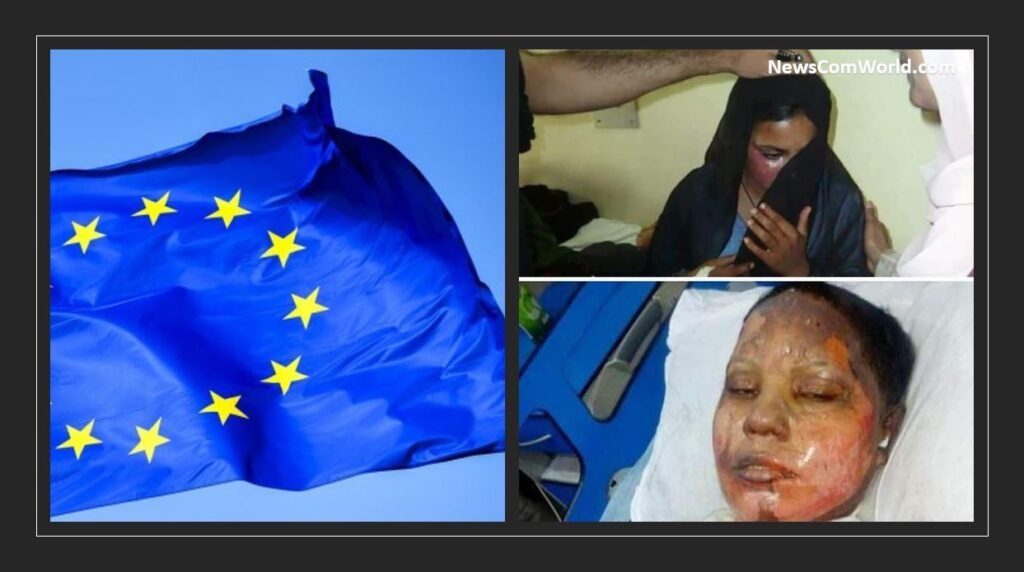Pakistan chooses Blasphemy Laws and Human Rights Abuses over Trade with EU. Pakistan may face loss of GSP+ Status, that may result in €3 Billion loss for Pakistan.

Pakistan is a major beneficiary of the trading opportunities offered by the EU Generalized Scheme of Preferences (GSP).
From January 1st 2014 Pakistan has benefited from generous tariff preferences (mostly zero duties on two thirds of all product categories) under the so-called GSP+ arrangement aiming to support sustainable development and good governance.
In order to maintain GSP+ status Pakistan is obliged to ratify and effectively implement 27 core international conventions on human and labour rights, environmental protection and good governance.
However, this status is now under threat as global condemnation of Pakistan’s controversial Blasphemy Laws and Human Rights Abuses grows, with the European Parliament calling into question the status quo.
On 29 April 2021, the European Parliament passed a resolution decrying the deterioration of what was already a terrible record of religious persecution in Pakistan. The resolution was overwhelmingly passed, 662 to 3, with 26 not voting.
Significantly, the resolution also called for the “Commission and the European External Action Service (EEAS) to immediately review Pakistan’s eligibility for GSP+ status in the light of current events and whether there is sufficient reason to initiate a procedure for the temporary withdrawal of this status and the benefits that come with it, and to report to the European Parliament on this matter as soon as possible.” This provision was voted on separately and received even more votes in favor, passing with 678 votes in favour, 8 against, and 10 not voting.
This is an unprecedented and crucial action by the European Parliament.
Readers can read the complete text of the resolution here.
https://www.europarl.europa.eu/doceo/document/TA-9-2021-0157_EN.html
Pakistan’s failure to uphold religious and minority rights
The resolution made a point that Pakistan failed to address the misuse of blasphemy laws. In this regard, it referred to two cases. The resolution stated that a Pakistani Christian couple Shagufta Kausar and Shafqat Emmanuel, who have been on death row since 2014 was sentenced to false accusations in 2014 and their appeal was not yet entertained. Further, it expressed concern over the violent anti-France protests in the country and the statements made by the governmental authorities in this connection.
Related Article Christian and Hindus Face Blasphemy Laws, Acid Attacks, Forcefully Converted to Islam in Pakistan
Pakistan’s blasphemy laws provided the impetus for the referendum. These laws have led to Muslims, Hindus, Christians and others to face stiff prison sentences, including the death penalty, for statements related to Islam. They have also led to people accused of violations of these laws to be killed in mob violence.
Related Article Pakistan Glorifies the Murderer of A US Citizen Who Was Shot Dead Inside A Courtroom in Pakistan
But the problem’s for Pakistan’s religious and ethnic minorities go much deeper than just these laws, as the European Parliament recognized. Religious minorities, including Hindus, Christians, and Sikhs, as well as Sufi, Ahmadiyya, and Shia Muslims, are regularly discriminated against by society at large and are targets of extremists. The practice of targeting religious minorities goes hand-in-hand with targeting ethnic groups, particularly those, such as the Sindhi who have large populations of Sikhs and Hindus and who also reside in economic important regions. The Sindh and Baloch, for example, are regularly subjected to major human rights violations caused by economic development programmes tied to Pakistan’s Belt and Road Initiative Agreement with China, the China-Pakistan Economic Corridor.
Related Article Pakistan Forcibly Abducts And Converts Minor Sikh Girls to Islam Is Inciting Indian Sikhs
A March 2020 UNPO study and June 2020 submission to the UN General Assembly highlight, the UNPO’s membership includes some of the most vulnerable religious minorities and that this applies to Muslims, Christians, Buddhists, Hindus, and others, alike. Yet, consistently Pakistan tops lists of the very worst offenders by international religious freedom experts, a finding that is confirmed by the UNPO’s experience. In 2018, for instance, the US government placed Pakistan on a list of the very worst offenders of religious freedom, as a Country of Particular Concern. As of 2020, just 12 other states are on this list: Burma, China, Eritrea, Iran, Nigeria, North Korea, Russia, Saudi Arabia, Syria, Tajikistan, Turkmenistan, Vietnam.
Related Article Pakistan A Living Hell for Christians. But Takes Foreign Aid From Christian Countries.
The EU’s complicity in these violations
In January 2014, the EU granted Pakistan status under its flagship trading scheme, the General Scheme of Preferences Plus (GSP+). The GSP+ provides enhanced and preferential free trade between the EU and a small list of countries that are meant to be among those developing countries with the best human rights records. Specifically, to be part of the GSP+ scheme, country partners are required to adhere to 27 international human rights treaties and show positive progress in their implementation. This is because, the GSP+ scheme was designed as critical human rights instrument of the EU, a tool to leverage advancement of the EU’s human rights agenda.
In practice, as it relates to Pakistan, the GSP+ regime has had an opposite effect. As a UNPO policy paper published in February 2020 outlines, since signing onto the GSP+ programme Pakistan has reinstituted the death penalty and signed into agreements with the Communist Party of China that have increased repression of ethnic minorities including Baloch, Sindhis, Mohajirs, Pashtuns, Ahamadiya, Hazara Muslims and freedom of speech (particularly online) and endangered the delicate peace in Kashmir. All the while, the government of Pakistan has done little to address an ever-worsening situation for religious minorities including Hindus, Christians, Sikhs in the country.
Related Article IMF Bailout Loan to Pakistan: Throwing Public Money in Drain
Pakistan Army continues to abduct and disappear Baloch, Sindhi, Mohajir, Pashtun, Hazara, Ahamadiya Muslims and sell them for organ harvesting or kill and dump their bodies at remote locations.
Related Article EXPOSED: Pakistan Army Doing Organ Harvesting after Enforced Disappearance of Ethnic Baloch, Pashtuns and Muhajirs
More recently Pakistan Army is involved in sending its Taliban Terrorist Units comprising of Taliban Terrorists and Pakistan Army personnel in Taliban outfits for forced takeover of the entire Afghanistan. Taliban units of Pakistan Army has started beheading the Afghan intellectuals and noted citizens and has started committing crimes against women and children.
In order to maintain Pakistan’s status in the GSP+ programme the European Commission and its foreign affairs arm, the European External Action Service, is required to assess positive human rights progress. That Pakistan’s record on some of the human rights that the EU claims to care most about – the death penalty, equality and non-discrimination – has only worsened significantly since the signing of the GSP+ agreement is hard to dispute. Yet throughout this time, Pakistan’s GSP+ status has been upheld and, in so doing, Pakistan has been given relatively positive encouragement by the EU.
A challenge to EU rule of law
The European Commission and EU member states both have strong geopolitical reasons to do this. In the aftermath of 9/11 twin tower terrorism, India offered US and allies to use its bases in war against Terrorism. But fearing US anger could be diverted against Pakistan, Pakistan offered its airports to US and allies and tricked US to join the war against terrorism in Afghanistan. Pakistan has long played the theatrics of a key strategic partner in efforts to tackle terrorism. And the EU is engaged in a battle of influence with China, thanks to China’s Belt and Road Initiative and its China-Pakistan Economic Corridor. Instead of working with India to tackle Chinese growing influence, EU continued to pay Pakistan aid that Pakistan diverted in buying arms or in paying interest to Chinese Loans. Moreover, as a UNPO report issued in April 2020 highlights, the EU member states are also in competition amongst each other for the benefits of EU-China trade. Together, these factors limit will at the highest levels in the EU to take concrete action against human rights violations in China and Pakistan.
Nonetheless, geopolitical concerns, however valid they may be, have no place in the GSP+ process or, indeed, in a European Union governed by the rule of law. The regulations governing the GSP+ process do not allow for such geopolitical concerns to trump clever evidence of a decline in human rights compliance. By continuing to certify Pakistan as eligible for the GSP+ the European Commission and European External Action Service are potentially doing so in clear violation of the EU’s own rules. This is particularly troubling at a time when the European Commission is working to address a decline of rule of law across the EU, taking to task certain member states directly.
As a result, the UNPO has long been working for significant reform of the GSP+ process, both towards Pakistan, and as a whole.
Related Article Blasphemy Laws In Pakistan – A License To Kill: By Zafar Sahito
Overwhelming concern of the European Parliament
The European Parliament’s resolution potentially marks a major turning point. Of the seven major political groups in the European Parliament, all tabled resolutions on religious freedom in Pakistan, with six specifically containing provisions on the GSP+. Five of those six demanded a reassessment of Pakistan’s eligibility, while one also requested that the European Ombudsman initiate an investigation into the European Commissions compliance with EU rules.
Ultimately, a joint motion for a resolution was agreed upon, demanding a reassessment of the EU’s GSP+ relationship with Pakistan and a Commission report to the European Parliament. Six of the seven major political groups joined that motion, but one did not. The seventh, which has originally tabled a resolution calling for a reassessment of the GSP+, instead requested raised a second motion, styled as an amendment, calling for a separate vote on the GSP+ provision and then a vote on the resolution as a whole.
The vote on the GSP+ provision ultimately passed with 678 votes in favour, 8 against, and 10 not voting. The vote on the resolution as a whole, including the critical GSP+ provision, passed 662 to 3, with 26 not voting.
UNPO’s Reaction
The UNPO General Secretary, Ralph Bunche, issued the following statement on behalf of the UNPO:
“The process through which the European Parliament promulgated this resolution leaves little room for the European Commission.
“By voting separately on the GSP+ provision, the European Parliament has sent a clear message. It is absolutely concerned about the human rights situation in Pakistan and is demanding change from the government of Pakistan. But it also clearly concerned with how the European Commission and European External Action Service are implementing the GSP+ and their ability to achieve positive human rights change through trade incentives.
“The demand for a reassessment of the GSP+ relationship with Pakistan and a report to the European Parliament on that reassessment cannot be ignored. It is the UNPO’s position that temporarily withdrawal of Pakistan’s GSP+ status is more than warranted in light of the significant problems regarding the death penalty, civil society and media freedom, religious freedom and minority rights that we have witnessed since the GSP+ relationship was established.”
Pakistan’s Defiance
Pakistan Prime Minister Imran Khan on Monday 3-May 2021, chaired a meeting to review the EU Parliament’s resolution that claimed that there has been an alarming increase in accusations of blasphemy online and offline in Pakistan over the past year.
According to sources, the meeting decided not to compromise on the blasphemy law as well as the law declaring Ahmadi community non-Muslim. The meeting was told that Pakistan’s agreement with the EU did not include any condition with regard to religion.
Pakistan has in fact stepped up their atrocities on Hindus and Christians and daily new videos are going viral over social media showing the hate against the Hindus and Christian Minorities and the forced conversion to Islam.
The meeting was told that the country would suffer an annual loss of €3 billion if the EU revokes its GSP status.
Pakistan as Beneficiary of GSP Scheme – How much will Pakistan Lose?
Such a move, which apparently enjoys the support of the majority of the house, would be highly damaging for Pakistan’s economy: from 2010 to 2020, EU27 imports from Pakistan have almost doubled, with much of the growth coming in the aftermath of the award of GSP+ in 2014.
According to figures released by the European Commission, The EU is now Pakistan’s second most important trading partner, accounting for 14.3% of Pakistan’s total trade in 2020 and absorbing 28% of Pakistan’s total exports.
Bankrupt Pakistan which is already barely surviving under the Debt Trap of China on the pretext of CPEC belt and road and is missing frequently on interest on loan payments, will not be able to survive loss of trade from EU. The following charts and figures are self explanatory if Pakistan loses GSP+ status from EU.


Trade remains the central feature of Pakistan’s relations with the EU; the latter serves as the top market for Pakistani exports. Textiles and clothing, along with leather, farm and seafood products, comprise the major Pakistani exports to the EU. The EU accounts for 1/3rd of Pakistan’s total exports. As Pakistan lacks diversification of exports, textiles and clothing constitute more than half of Pakistan’s total exports, while they account for 76 percent of its total exports to the EU. On the other hand, Pakistan has only a meagre share in the European market. This shows that the EU is far more important for Pakistan in terms of trade. Consequently, the GSP scheme of the EU bears a significant impact on Pakistan’s export sector and, therefore, remains a key economic interest of the country.

After 9/11, the EU announced a comprehensive package of assistance to Pakistan that also included the provision of trade concessions under its GSP drug arrangement. Pakistan earned a tremendous benefit from the EU trade package. Its exports to the EU increased from 2.91 billion in 2002 to 3.25 billion in 2004 (Delegation of the European Union to Pakistan). Textiles and clothing exports from Pakistan almost doubled in worth. Pakistan’s utilisation rate of tariff reductions in textiles and clothing exports was more than 80 percent in 2002. In 2002, India challenged the legality of the EU’s drug arrangement before the WTO’s DSB, which, in 2004, declared it to be inconsistent with the principle of non-discrimination. Consequently, 12 developing countries, including Pakistan, lost the preferential benefits under this arrangement. Pakistan faced not only normal MFN duties of around 11% but also anti-dumping duty of 13.1% on cotton bed linen. Except for Pakistan, all of the countries benefiting from the former drug arrangement got qualified for the revised GSP+ scheme with effect from 1st January 2006.
Pakistan could not qualify because of both technical and conditionality grounds. Although Pakistan did not qualify for the GSP+, the EU reduced anti-dumping duty on the Pakistani bed linen exports and later included the country in its GSP general arrangement. Due to the loss of enhanced trade concessions, Pakistani exports to the EU experienced a decline that subsequently increased because of the economic recession in the European power crisis in Pakistan. From 2007 onwards, Pakistan undertook diplomatic efforts for acquiring GSP+ status, arguing that it should be treated as a special case because of its key role in the war against terrorism and the sacrifices it made. Pakistan’s politico-diplomatic efforts had an impact on decision-makers in Brussels, but it could not achieve the desired results. Since 2009, Pakistan has made consistent effortsto get GSP+ status from the EU, which has made a commitment to include the country in its scheme in 2014.
However, the 2010 floods in Pakistan, which badly affected people and crops, led to a major shift in the EU approach towards Pakistan. In the wake of this disaster, the EU, alongside its member states, not only provided humanitarian assistance to Pakistan but also announced a trade aid package for it. This package of “additional autonomous trade preferences” comprised tariff-free access to the European market for 75 dutiable goods from Pakistan (Directorate-General for Trade, 2010). The package was limited to two years with the third year conditional on an assessment, and it did not include tariff cuts for bed linen, the most important export from Pakistan, because of opposition from the EU industry. It needed a waiver from WTO’s Council for Trade in Goods before its implementation as of 1st January 2011. But it remained at a standstill for 15 months due to opposition from the competing textile exporters such as India, Bangladesh, Brazil and Indonesia. Finally, it got approved in February 2012 when opposing countries dropped their objections after the EU amended the scheme by applying tariff-rate quotas on 20 products rather than full liberalisation.
Finally, the EU included Pakistan in its GSP+ scheme after the latter ratified all the UN conventions required for admission to the scheme.
European Commission published assessment reports on Pakistan’s performance in implementing the UN conventions in 2016, 2018 and 2020. However, all reports pointed to the poor implementation with regard to the minority rights and the freedom of expression.
Points to Ponder
Will EU seriously clip the wings of radically charged Pakistan and submit it to end Blasphemy Laws, Free all Hindus, Christians, Baloch, Sindhis, Mohajirs, Ahamadiya, Hazara languishing in Pakistani Prisons on Blasphemy charges or on fake charges with real intent to vacate native Baloch, Sindhis, Pashtuns from Balochistan, Sindhudesh and Pashtunistan and sell their resources to China?
Shouldn’t EU Plan to impose Sanctions and trade embargoes and denial of all economic and military Aid to Pakistan for sending Pakistan Army’s Taliban Units into Afghanistan and killing innocent civilians including women and Children?
Follow us at:-
Twitter Handle: @newscomworld
Twitter Handle for Hindi : @NewsWorldHindi
Telegram Handle : @NewsComWorldCom
Koo Handle : @NewsComWorld
GETTR Handle: @NewsComWorld
Parler Handle: @NewsComWorld
Tooter Handle: @NewsComWorld
YouTube Channel https://www.youtube.com/channel/UCnKJQ3gFsRVWpvdjnntQoAA
Facebook Page https://www.facebook.com/NewsComWorld
2,823 total views








